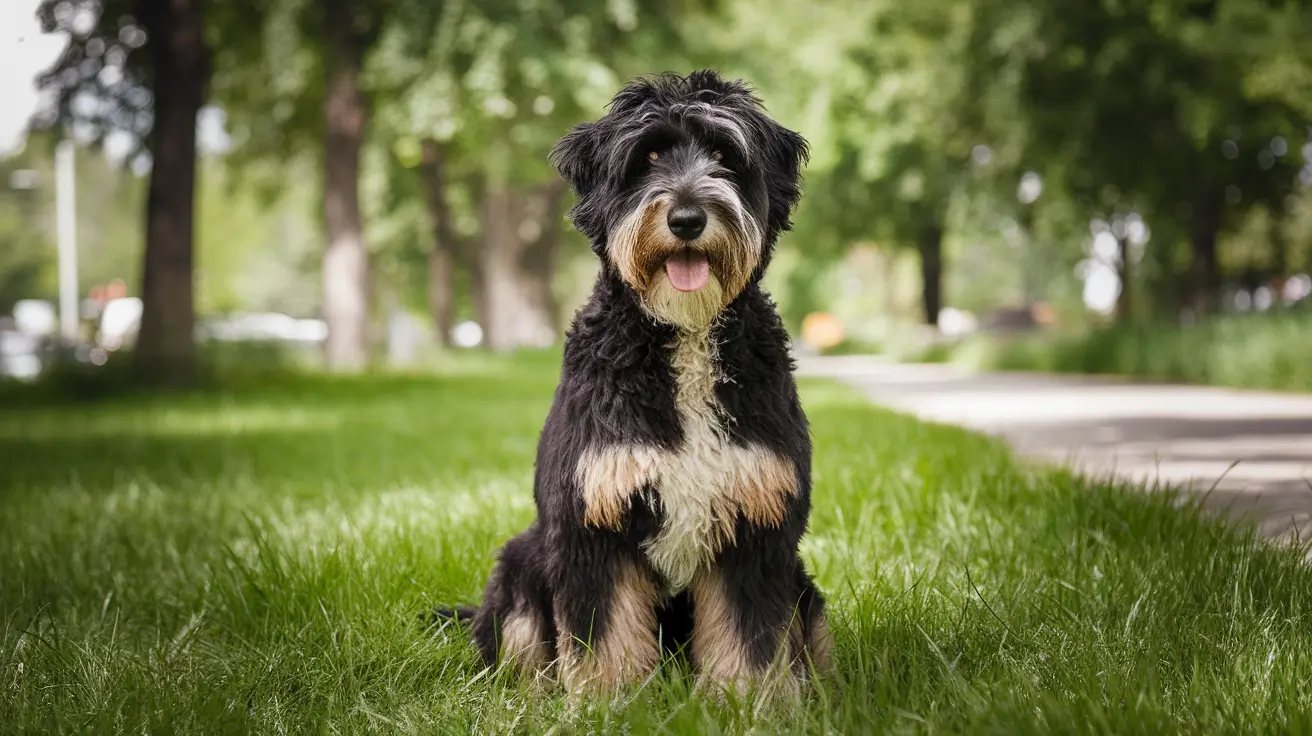Introduction to Bernedoodles
Bernedoodles, a crossbreed between Bernese Mountain Dogs and Poodles, have quickly become a popular choice for dog lovers. Known for their intelligence and friendly nature, these dogs are celebrated for their adaptability to various living situations. One of the standout features of Bernedoodles is their low-shedding coats, which makes them an excellent choice for individuals with allergies or those who prefer a cleaner home environment. This breed's versatility and charming personality make them an ideal companion for families and individuals alike.
Health and Wellness
While Bernedoodles are generally healthy, they are predisposed to certain health issues that owners should be aware of.
Hip and Elbow Dysplasia: These inherited conditions involve abnormalities in the joints, which can lead to arthritis if untreated. Maintaining a healthy weight is crucial to minimize stress on the joints. Treatment options include medication, joint supplements, or surgery in severe cases.
Eye Conditions: Progressive Retinal Atrophy (PRA) is a common eye condition in Bernedoodles, leading to vision loss. Symptoms include clumsiness and night blindness. While there is no cure, affected dogs can still enjoy a good quality of life.
Allergies: Despite their low-shedding coat, Bernedoodles can suffer from allergies caused by food or environmental factors. Symptoms include itching, rashes, and ear infections. Veterinary consultation is recommended for proper diagnosis and treatment.
Gastric Dilatation-Volvulus (GDV): This life-threatening condition is more common in larger Bernedoodles, where the stomach fills with gas and twists. Symptoms include a distended abdomen and excessive drooling. Immediate medical attention is crucial.
Von Willebrand’s Disease (VWD): This genetic disorder affects blood clotting, causing excessive bleeding from minor injuries. While there is no cure, management involves careful monitoring and avoiding situations that could lead to injury.
Nutrition Essentials
Proper nutrition is vital for Bernedoodles at all life stages.
Dietary Needs: A diet approved by the Association of American Feed Control Officials (AAFCO) ensures a balanced intake of nutrients. Puppies require three to four meals daily, while adults should have two. Using a slow feeder can help dogs who eat too quickly.
Nutritional Variations: Factors such as size, health, and lifestyle can influence dietary needs. Consulting with a veterinarian can help tailor a feeding plan. Generally, a balanced diet should suffice, with supplements only if recommended by a vet.
Effective Training Techniques
Bernedoodles are intelligent and eager to learn, making training an enjoyable experience.
Positive Reinforcement Training: This method involves rewarding good behavior with treats, praise, or toys, encouraging the dog to repeat desired actions.
Clicker Training: Using a distinct sound to mark desired behavior, clicker training helps Bernedoodles associate the sound with a reward, enhancing learning.
Mirror Training: By mimicking the owner's actions, Bernedoodles can learn through observation, reinforcing behaviors by copying.
Relationship-Based Training: Building a strong bond through understanding emotions and body language is key. This approach focuses on shaping behavior through positive interactions.
Grooming and Maintenance
Regular grooming is essential for maintaining the health and appearance of a Bernedoodle's coat.
Grooming Needs by Coat Type:
- Curly Coat**: Requires daily brushing to prevent matting and professional grooming every 6-8 weeks.
- Straight Coat: Needs brushing a few times a week and occasional professional grooming.
- Wavy Coat: Should be brushed every other day with professional grooming every 4-8 weeks.
General Grooming Tips: Regular bathing, nail trimming, ear cleaning, and teeth brushing are vital for overall health and hygiene.
Lifestyle and Exercise Requirements
Bernedoodles are energetic dogs that need regular physical activity to stay healthy and happy.
Physical Activity Needs: At least an hour of daily exercise is recommended, varying by age. Puppies need short walks and playtime, adults benefit from vigorous exercise, and seniors require gentle walks.
Adaptability in Living Situations: While Toy and Miniature Bernedoodles can thrive in apartments, Standard Bernedoodles prefer more space. However, with adequate exercise, Bernedoodles of any size can adapt to various environments.
Conclusion: The Joy of Owning a Bernedoodle
Owning a Bernedoodle is a rewarding experience, filled with joy and companionship. By understanding their specific needs in health, nutrition, training, grooming, and exercise, you can ensure a fulfilling life for your furry friend. Whether you live in a bustling city or a spacious countryside, a well-cared-for Bernedoodle can bring happiness and warmth to any home.






